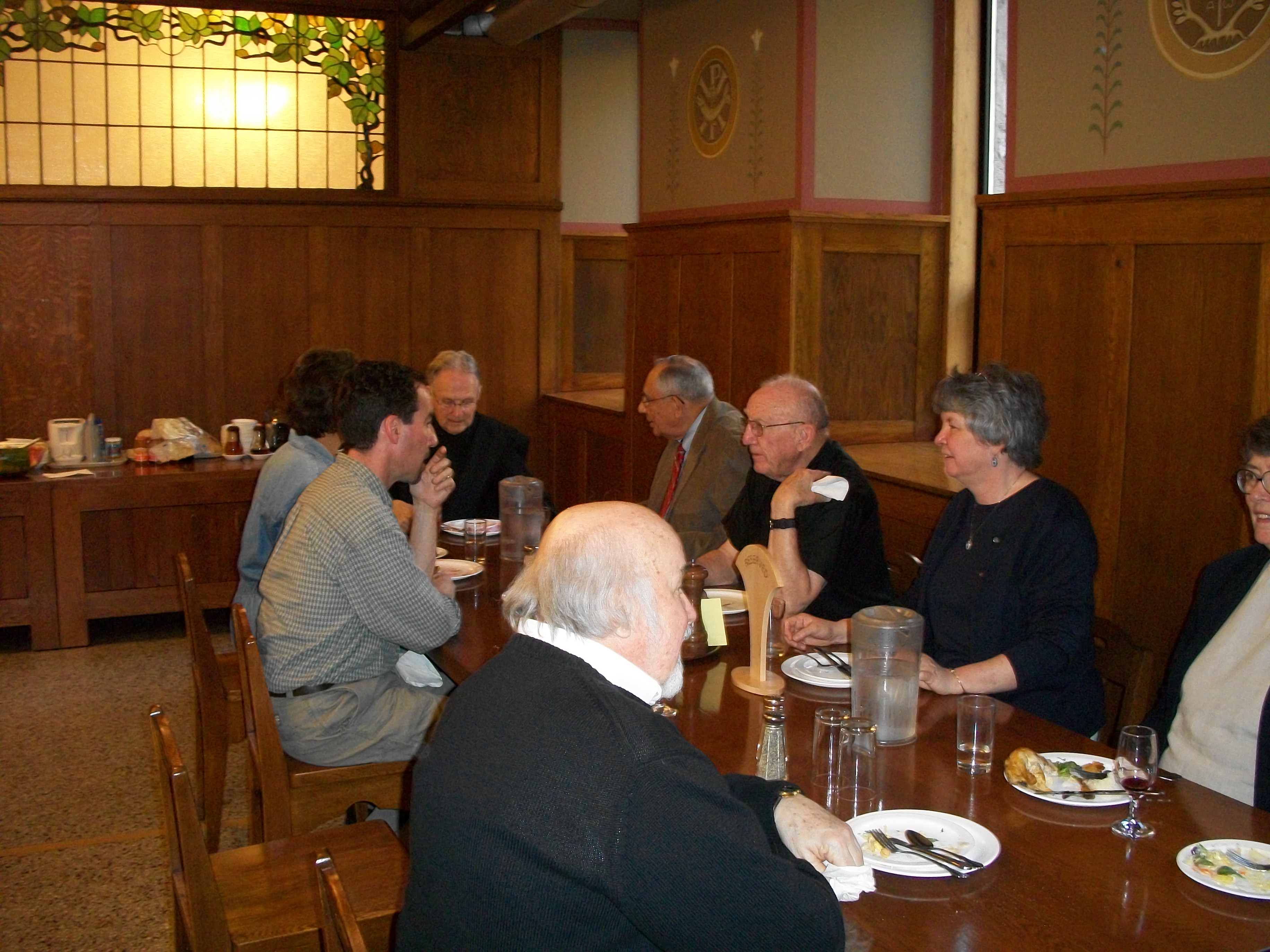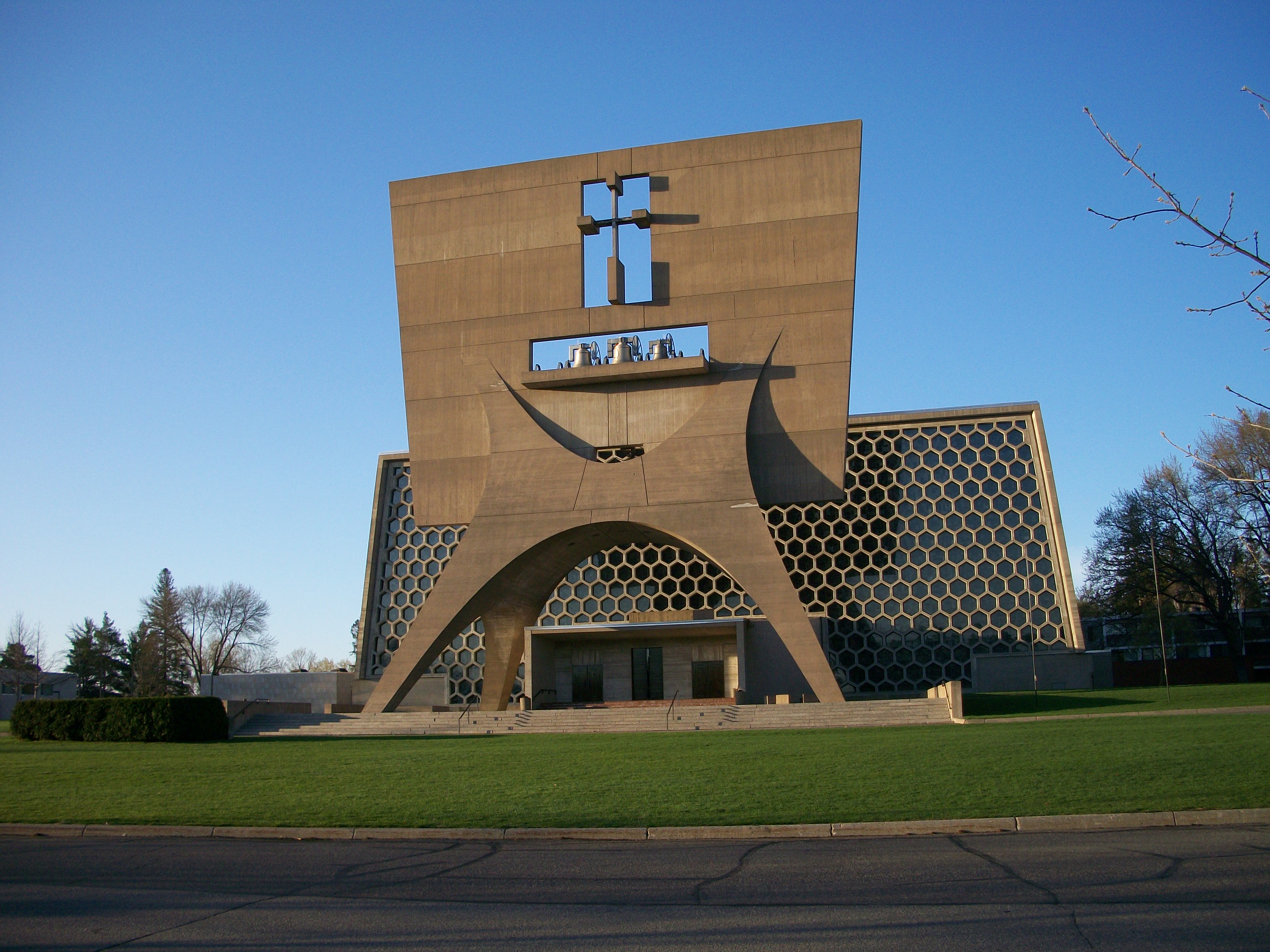![collegeville-lecture-3[1]](http://wp.production.patheos.com/blogs/freelancechristianity/files/2012/10/collegeville-lecture-31.jpg?w=150) I spent the Spring 2009 semester on sabbatical as a Resident Scholar at
I spent the Spring 2009 semester on sabbatical as a Resident Scholar at![images[8]](http://wp.production.patheos.com/blogs/freelancechristianity/files/2012/10/images8.jpg) the Collegeville Institute for Ecumenical and Cultural Research in Collegeville, MN. Father Kilian McDonnell is a living legend there. He is the founder and President Institute; a nice oil painting hangs in tribute in the Institute’s Butler Center. Although the Institute has a director and staff, Kilian’s influence and presence looms large. He is treated like Merrill Lynch once was treated. When he speaks, people listen.
the Collegeville Institute for Ecumenical and Cultural Research in Collegeville, MN. Father Kilian McDonnell is a living legend there. He is the founder and President Institute; a nice oil painting hangs in tribute in the Institute’s Butler Center. Although the Institute has a director and staff, Kilian’s influence and presence looms large. He is treated like Merrill Lynch once was treated. When he speaks, people listen. ![41+O7sGvOUL._SL500_AA300_[1]](https://wp-media.patheos.com/blogs/sites/766/2012/10/41o7sgvoul-_sl500_aa300_1.jpg?w=150) Kilian started writing poetry fifteen years ago, when he was 75. Now at age 90, his fourth book of poetry is about to be published.
Kilian started writing poetry fifteen years ago, when he was 75. Now at age 90, his fourth book of poetry is about to be published.
There are Kilian stories in every corner of the Institute and St. John’s University in Collegeville where the Institute is located; my favorite is about Kilian and the helicopter. Some years ago, Kilian arrived at evening prayer with a packed suitcase. Shortly after prayers began, the monks were interrupted by the deafening sound of a helicopter landing right in front of the Abbey in order to whisk Kilian off to yet another important event requiring his presence. He hopped on board and the helicopter lifted. Prayers then resumed, only to be interrupted yet again by a descending helicopter. Kilian had forgotten his suitcase; once again united with his luggage, the helicopter lifted carrying him to distant parts, while evening prayer picked up once again.
Kilian has a wonderful, Irish sense of humor. I once sent him an email in which I incorrectly spelled his name “Killian.” In a return email, Kilian corrected me writing that “they only gave me one ‘L’. Maybe when I get to heaven I’ll get to have another one.” Kilian and a fellow monk, Wilfred, attend almost all Institute scholar lunches and evening get-togethers—as Kilian says, “I may miss evening prayer, but I never miss a party.”  Kilian and Wilfred needle each other constantly, with Wilfred poking fun at the “fame” and “special importance” of a humble Benedictine monk, and Kilian responding that those who are famous and out of the ordinary obviously deserve special treatment. One Sunday after mass Kilian and Wilfred invited the Institute scholars to brunch in the monk’s dining room (a rare treat for non-monks). Kilian met us at the pre-arranged spot in order to lead us into the labyrinthine depths of the monastery, but Wilfred was nowhere to be found. Someone asked if we should wait for Wilfred; Kilian retorted “I’m willing to wait for scholars, but I’m not waiting for Wilfred!”
Kilian and Wilfred needle each other constantly, with Wilfred poking fun at the “fame” and “special importance” of a humble Benedictine monk, and Kilian responding that those who are famous and out of the ordinary obviously deserve special treatment. One Sunday after mass Kilian and Wilfred invited the Institute scholars to brunch in the monk’s dining room (a rare treat for non-monks). Kilian met us at the pre-arranged spot in order to lead us into the labyrinthine depths of the monastery, but Wilfred was nowhere to be found. Someone asked if we should wait for Wilfred; Kilian retorted “I’m willing to wait for scholars, but I’m not waiting for Wilfred!”
Once during my sabbatical, St. John’s was visited by Cardinal Kasper,![images[2]](http://wp.production.patheos.com/blogs/freelancechristianity/files/2012/10/images2.jpg?w=150) the Vatican’s bigwig on ecumenical dialogue, coming to receive the University’s Pax Christi award. Given Kilian’s stature as the founder and President of the Institute, as well as his lifelong contributions to liturgical reform in the Catholic Church, he was part of almost every lunch, tour, and discussion during the Cardinal’s whirlwind visit. A couple of days later, Kilian and I were walking together from our Institute offices in the bowels of the library across to the Abbey
the Vatican’s bigwig on ecumenical dialogue, coming to receive the University’s Pax Christi award. Given Kilian’s stature as the founder and President of the Institute, as well as his lifelong contributions to liturgical reform in the Catholic Church, he was part of almost every lunch, tour, and discussion during the Cardinal’s whirlwind visit. A couple of days later, Kilian and I were walking together from our Institute offices in the bowels of the library across to the Abbey for noon prayer. I noticed that Kilian was low on energy and walking more slowly than usual, but didn’t say anything. Kilian did. “Vance, don’t ever get old. Getting old is God’s worst idea.”
for noon prayer. I noticed that Kilian was low on energy and walking more slowly than usual, but didn’t say anything. Kilian did. “Vance, don’t ever get old. Getting old is God’s worst idea.”
Indeed it is. Kilian would undoubtedly agree with Jeanne, who simply says that “getting old sucks.” Jeanne and I are only in our later fifties, mere youngsters in many people’s estimation, I’m sure. But the swift passage of time is hard to ignore when my sons, 8 and 5 when we first met Jeanne, are now 34 and 31, when the Stairmaster tells me that my maximum heart rate when working out is 25 beats less per minute than it was when I started exercising regularly years ago, and when the face looking back at me from the mirror always looks a lot older than I expect (even when I’ve looked at the reflection several times that day). ![tumblr_mchlgp7T8f1rn7xh6o1_500[1]](http://wp.production.patheos.com/blogs/freelancechristianity/files/2012/10/tumblr_mchlgp7t8f1rn7xh6o1_5001.jpg?w=300) Talk about planned obsolescence. When teaching the existentialists, my students often ask why Sartre, de Beauvoir, Camus, et al are so morbid and obsessed with death. My response is that the existentialists are trying to counter our human conviction that we are immortal. Oh, we don’t say that, but we live our lives as if we have all the time in the world, as if we will never die. We “know” that we are short-term creatures, but we don’t want to hear about it. As
Talk about planned obsolescence. When teaching the existentialists, my students often ask why Sartre, de Beauvoir, Camus, et al are so morbid and obsessed with death. My response is that the existentialists are trying to counter our human conviction that we are immortal. Oh, we don’t say that, but we live our lives as if we have all the time in the world, as if we will never die. We “know” that we are short-term creatures, but we don’t want to hear about it. As ![images[1]](https://wp-media.patheos.com/blogs/sites/766/2012/10/images12.jpg) Tolstoy reminds us in The Death of Ivan Ilyich, it’s one thing to intellectually affirm the familiar syllogism that
Tolstoy reminds us in The Death of Ivan Ilyich, it’s one thing to intellectually affirm the familiar syllogism that
All men will die.
Socrates is a man.
Therefore, Socrates will die
It’s another thing entirely to realize what this means.
All men will die.
Vance is a man.
Therefore, Vance will die.
Sometimes it takes a life-threatening illness (as for Ivan Ilyich) to get the idea. I’m gradually getting it just by looking in the mirror.
Psalm 90, one of the psalms at evening prayer yesterday, is all about this. God is eternal, and you’re not. And as usual, the Psalmist doesn’t pull any punches. Verses 5 and 6: “You sweep us away like a dream; we fade away suddenly like the grass. In the morning it is green and flourishes; in the evening it is dried up and withered.” Verse 10: “The span of our life is seventy years,
com/2012/10/imagescao2clqx.jpg?w=150″ width=”150″ height=”112″ /> perhaps in strength even eighty; yet the sum of them is but labor and sorrow, for they pass away quickly and we are gone.” True, but certainly not comforting. Sartre or Camus could have written verse 12: “So teach us to number our days that we may apply our hearts to wisdom.” In a bad mood, this doesn’t sound much better than “Life’s a bitch and then you die.” In a better mood, I can skip the “life’s a bitch” part, but my days are still numbered.
There’s no promise of eternal life, of bliss in heaven. That’s a New Testament concept. And to be honest, I’m not attracted to the idea that this life is just practice for eternity, even though that often seemed to be the only reason to be a Christian in my youth. Perhaps I’m too influenced by the existentialists—I want to live my life at least trying to stay conscious of being a short-term creature. And the Psalmist provides the proper daily attitude focus, with just a hint of wishful thinking thrown in.
I n the morning, fill us with your love.
n the morning, fill us with your love.
We shall exult and rejoice all our days.
Give us joy to balance our affliction,
for the years when we knew misfortune.
Show forth your work in your servants,
let your glory shine on their children.
May the graciousness of the Lord our God be upon us;
prosper the work of our hands;
prosper our handiwork.
There’s no guarantee that joy and affliction will balance out at the end of my life. But rejoicing is a verb and a choice, even for a short-term creature.












